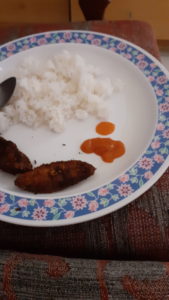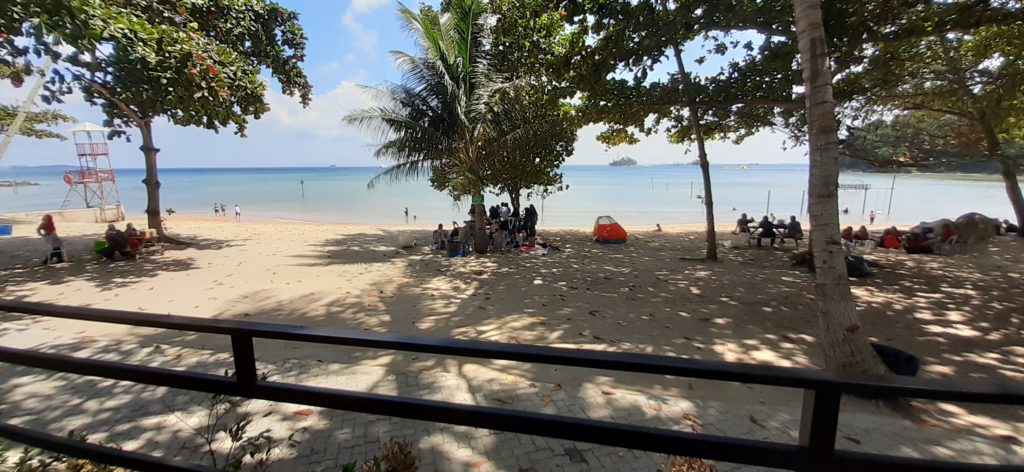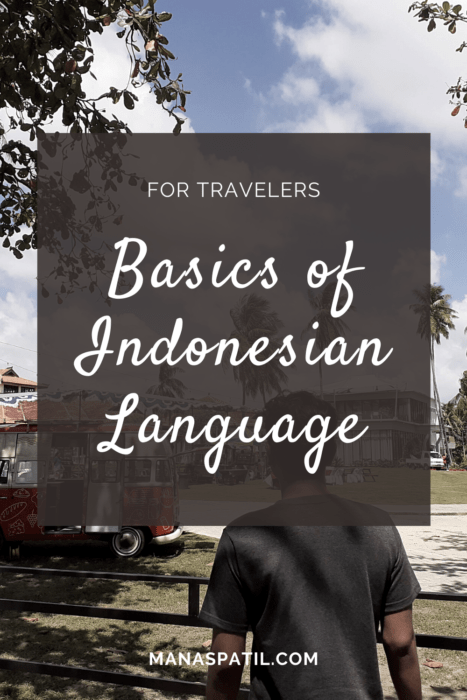Indonesian language basics: Whenever I have a conversation with someone about where I’m from and why I came back to India, people ask me to speak Indonesian. Yes! I do speak the Indonesian language and not just its basics!
I stayed in Indonesia for 8 years and obviously learned something. Since many ask me this, I decided to put down these basic Indonesian phrases to use on your travel. Trust me, they’re easy.
Indonesian Language Basics: How to Greet
When visiting Bali or traveling to Indonesia, the greeting is worth keeping in mind.
Phrases for greeting in Indonesian:
- Begin ‘As-Salamu Alaykum‘ –This is the most respectful way to begin a conversation.
- Go with ‘Salaam‘- that’ll work too.
- When talking to a man, you can also add Salaam pa. Pa is short for Bapak which means ‘father’ or ‘Mr.’ in this case.

When greeting with relation to the time, use one of the phrases below:
- Selamat Pagi (Good morning)
- Selamat Siang (Good afternoon). Also, use Selamat Sore when it’s late in the afternoon. It won’t make much of a difference.
- Selamat Sore (Good evening)
- Selamat Malam (Good night)
Alternative phrases to use for time-related greetings:
- Instead of Selamat Pagi, you can also say Pagi Pagi.
- The same applies to say good night: Malam Malam.
Gestures to Remember when speaking in Indonesia
Remember to bow when you meet someone – it’s the most-used form of use of respect. Don’t bow too much. Don’t disregard it. Whenever you greet, bow a little while you’re greeting them.
Even when you don’t know what to say, you can simply greet with a smile and a bow, that’s the simplest way to greet anyone you meet.
Travel blogs to check out on Indonesia:
- Perfect Bali Travel Blog
- Ultimate Batam Travel Guide, Indonesia
- Abang Island Snorkeling, One Day Trip- Batam Riau
Indonesian Language Basics: Common Phrases You’ll Hear
- Apa Kabar – How are you: The first thing the person would ask after you greet would be Apa Kabar. Whenever they say it, reply with- Kabar Baik (I’m good). Or for a more conversational reply say ‘Saya Baik, apa kabar?‘ (I’m fine, how are you?).
- Terima Kasih – Thank you: Given the hospitability of the people in Indonesia, you’ll hear a lot of thank yous for even simple stuff. So reply by saying ‘Sama Sama‘ (You’re welcome).
- Dari Mana? –Where are you from: When they assume you’re a tourist, they’ll ask your whereabouts. They can ask ‘Abang dari mana (where are you from, brother?)’. A good answer is – Saya dari (I’m from) and then followed by your country or city – you get the idea!
- Mau ka dimana / Pergi dimana –Where do you want to go?: When you’re on the road or just booking a ride to your destination, you’ll mostly hear this question. It means ‘where do you want to go?’ You can tell your destination’s name.
- To bring it in a little smoother, you can add – Saya mau ka (I want to go to) followed by your destination’s name. For example, Saya mau ka Bali.
Note: Saya means I/Mine. For ‘We’, use Kita. For example, Saya dari India is said as Kita dari India.
Keen on learning Bahasa Indonesia in a conversational tone? I picked out some courses for you on Udemy with great ratings. Don’t miss out on those deals! :
Speak of food and restaurants

This will help you when you’re eating out. To ask someone (your guide, you say- ‘Pak, disini dekat ada tempat makan?‘(Sir, is there a place to eat nearby?)
Now once you make it to the restaurant, the transaction is simple:
- You see the menu list
- You choose from the menu list
- And they get you the order.
It’s as simple as that when you go to any restaurant in the world. However, there are times when you need to speak to get something specific. So here are some of the phrases that’ll help you out:
- Makan– eat
- Nasi– rice. (Nasi Goreng- Fried Rice)
- Tidak mau/Tamau – I don’t want
- Bisah cepat, ya?– Make it fast, alright? (Yep, I’ve said this on a number of occasions)
- Mie– noodles
- Hanya sayuran/ sayuran saja– Only vegetables. If you’re a vegetarian, say this before you order.
- Minyak sedikit aja– just a little oil. To people who are concerned about their diet.
- Tamau pedas (I don’t want it to be spicy) or Mau pedas (I want it spicy)
- Saya suka ini– I like this.
- Minta satu lagi– I want one more (of the dish. Say this to order another one)
- Ini enak kali– This is delicious. Here ‘enak‘ means delicious.
Asking for Directions in Indonesian
Even in the age of Google Maps these days, I put it in because my phone battery dies at the wrong times of my travels. So here goes:
- Kanan– Right
- Kiri– Left
- Lurus– Straight /lurus aja– keep going straight
- Ini dimana?– Where is this?
- Dekat– near. This is used to ask or tell the landmark close to the destination. For example- Itu dekat Bali (It’s near Bali)
Counting Numbers in Indonesian (and Shopping)

When you’re in Indonesia on a vacation, then you shouldn’t get out without some shopping! Sure, the currency is a little complex, given the extra three zeros in front of anything you buy. But you still wouldn’t want to miss anything, would you?
Let’s start with the easy ones.
- Learn Indonesian language numbers: Satu (one), Dua, (two – and it goes on), Tiga, Empat, Lima, Enam, Tujuh, Lapan, Sembilan and Sepuluh (Ten).
- And then there’s thousand- ‘Ribu‘. So to say three thousand, you just prefix the three in Indonesian to ‘Ribu‘- Tiga Ribuh.
- When you want to say thirty thousand. Add ‘puluh‘ in between these two words for an extra zero. Thus it becomes- Tiga Puluh Ribu.
- For three hundred thousand, instead of ‘Puluh‘, you put in ‘Ratus (hundred)’. That is – Tiga Ratus Ribu.
- Next comes a million. Satu Juta is one million. In the same way, three hundred million is Tiga Ratus Juta.
Don’t worry if you’re confused about it. The moment you start speaking it out, you’ll find it easy. You can learn this in less than 10 minutes provided you put your head into it a little.
Shopping
Sorry to keep you waiting for this one!
- Harga (Price)
- Ini Berapa? or ini berapa harganya? (How much is this?)
- Ini Mahal kaali! (This is very expensive)
- Bisa lebih murah ya? (Can it be cheaper?)
- Bisah kurang? (Can I get a price reduction). In case the seller says ‘Tak bisa (can not)’, try your bargaining skills by continuing with ‘Bisa La!‘ (you can reduce brother) I never did bargain much, but I’ve seen my parents doing it a number of times :)
Other words that come in handy
These are simpler words to just keep in mind. But you’ll get to know them within some days of your stay there.
- Tidak apa apa or gapapa (It’s okay/ Nothing to worry about)
- Maaf! (I’m sorry)
- Hati-Hati (Be careful)
- Tolong! (Help!)
- Jam berapa? (What is the time?)
Conclusion
When heading out to Indonesia for a vacation, then my best guess would be Bali. Sure, all that I’ve provided here shall help out in Bali. It’ll also help in any part of Indonesia. Though accents and a few words sound different here and there, it’ll still be the same.

I do hope that helps. Say you have doubts or something particular you want to know about, comment below and I shall respond right away! That’s all to the Indonesian Language basics or Bahasa Indonesia as we know it.
Sampai Jumpa (Bye Bye)!
More travel blogs for you to check out:

Find this post helpful? Help me and pin it for later:
*This post contains affiliate link(s) where I receive a small commission at no additional cost of the products to you. I only recommend products that I trust.
